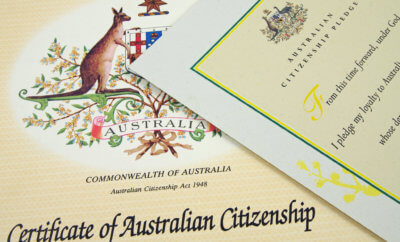Education
Immigrant Children Do Better in Academics than Native Children in Australia: Report

Representational image
Photo: Bigstock
The report by by the Organisation for Economic Co-operation and Development found that a child’s academic, social and emotional resilience can be attributed to the nation they came from as well as where they are settled.
Children from India, Philippines and China outperform their Australian classmates by significant margin, a global education report that was released on March 19 said. The report, titled “The Resilience of Students with an Immigrant Background: Factors that Shape Wellbeing,” also observed that students whose families had come from the United Kingdom, New Zealand, Scotland and Vietnam performed worse than Australian children.
Compiled by the Organisation for Economic Co-operation and Development (OECD), an intergovernmental economic organisation with 35 member countries, the report looked into the literacy, numeracy, and science performance — a baseline proficiency in these subject matters — of students in 64 countries. When it comes to the academic performance or “resilience” of migrant students, Australia ranked seventh among 64 nations taken for review, with 73 per cent of the children being “academically resilient.” Singapore tops the list with 91 per cent, followed by the Macao region of China, Hong Kong (China), Canada, Ireland and Estonia filling up the first six ranks.
The OECD report showed that migrant children’s academic, social and emotional resilience can be attributed to the nation they came from as well as where they are settled. The report said: “Immigrant students were at least twice as likely as native students to fail to achieve baseline levels of academic proficiency in Austria, Belgium, Denmark, Finland, Germany, Iceland, Japan, Luxembourg, Slovenia and Switzerland. By contrast, immigrant students in Australia, Canada and Hungary were as likely as native students to fail to achieve baseline academic proficiency.”
As per the report, for Chinese families, Australia is one of the best places in the world to settle, while for Indian families, it is the United Kingdom. While Indian immigrant children outperform Australian kids, they are likely to do even better in Britain.
The United Kingdom has 66 per cent academically resilient immigrant children, the United States is at 58 per cent, while Germany and Finland are at 57 per cent and 50 per cent, respectively.
The report’s findings reflect Australia’s highly selective migration program and the instruction in Australian schools for children whose first language isn’t English, Associate Professor Ken Cruickshank, an education lecturer at Sydney University, told ABC news. “I think it’s part of being a migrant that it’s the chance to succeed perhaps where the parents didn’t, and it’s the importance of that success for the family, and that idea that success in life comes through education,” he said.
The OECD report also showed an overall decline in academic performance of Australian students as per world standards. The baseline proficiency dropped for all Australian students between 2006 and 2015.




You must be logged in to post a comment Login